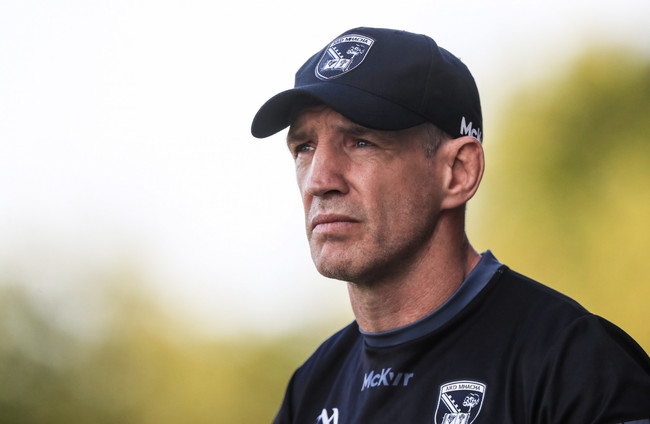THE CHAT ON the car radio turned to the weekend’s championship games. Armagh manager Kieran McGeeney, host Ivan Yates said, “flatters to deceive”. He’ll get you to a quarter-final, but that’ll be it.
It was a typical Ivan statement, delivered with bombast and probably a bit of irony; designed to get a rise out of halfwits like me. It worked. There I was tut-tutting to nobody in particular. The pronouncement touched a nerve because it’s not just Ivan making it; you’d hear people who know their stuff opine that Armagh need an Ulster title by now, or have to make it to the semi-finals today to show tangible progress.
I’m sure nobody feels Armagh need those things more than the management and team; they will hold themselves to that standard. Though, from the outside looking in, McGeeney appears to have them performing at close to their optimum level.
The evidence suggests he is an excellent manager, who improves players and improves teams.
When he took over in Kildare in late 2007, the team was not in a great spot. They’d lost by six points to Meath in the Leinster first round before exiting the championship in round two of the qualifiers, thoroughly outplayed by Louth in Newbridge.
McGeeney took them to the quarter-finals in 2008 through the qualifiers, recovering from a defeat to Wicklow in Leinster. They would make the quarter-finals, at least, in every other year of his tenure bar the final season of 2013.
In 2010 they were the width of a crossbar from beating Down to the All-Ireland final. The next season, 2011, was more heartbreaking again, a one-point loss to the Donegal side that won Sam the next season. They’d been edged out of Leinster by Dublin in a one-point game.
Kildare didn’t win silverware, yet they were contenders, capable of going toe-to-toe with anyone. You could not say that about them in the seasons before McGeeney took charge, nor could you since he left after a disappointing year in 2013.
Notable during McGeeney’s time in Kildare was the overall cohesion of the team, and the individual improvement of players. Johnny Doyle and Dermot Earley, the stars, thrived while the likes of Emmet Bolton and Eamonn Callaghan went from being decent county players to being among the best around in their positions. The development across the board was clear: Andriú Mac Lochlainn, Padraig O’Neill, Ronan Sweeney, James Kavanagh were among many who had progressed impressively.
When he was nudged aside at the end of 2013, voted out by the clubs, the players were aggrieved.
“Kieran, above anyone else that I’ve been involved with, has the characteristics of a great leader. I suppose his honesty, loyalty and respect are all genuine and players react to that,” Ronan Sweeney told Off The Ball at the time.
“Kieran has done more than anybody in the last six years, whether it be a player, club delegate, county board member, anyone. That’s why the players respect him and have so much time for him. He wants the best for Kildare football and the best for each individual in the panel and that’s all you can ask for.”
Enough of Kildare’s clubs and board delegates thought otherwise to force a change. Kildare have made the last eight twice since McGeeney left. The “flattering to deceive” form of making the quarter-finals at least for five seasons in a row to 2012 seems preferable.
Seeking a break from Ivan’s footballing proclamations, I pulled the car over and sought out a podcast McGeeney featured on. There was a chat with Tomás Ó Sé from 2020. If you missed it then it’s worth your time, a conversation in which McGeeney is far from his austere caricature. He’s what you’d expect: passionate about football, sees the joy in it and the people he’s met along the way; a deep thinker who seeks different perspectives.
“Is it true you surround yourself with fellas who will actually argue with you, who take you up on what you’re doing? Who don’t lie down and actually question what you’re about?” Ó Sé asks.
“Yep. And if you want to come to one of our team meetings you’d see that,” McGeeney says, going on to describe the sweat pumping after selections debates that have taken ours. “If you don’t have people around you that question and stuff, you’re as well there sitting on your own, like.”
To constantly question yourself, to invite stringent criticism from those around you – we’d all like to think we have these qualities, but in truth, not many do. It’s not possible to make the consistent strides that McGeeney’s Armagh have done without such an environment.
Progress has not been linear, it rarely is, but over time the arc is going in one direction. They were promoted from Division 3 in his first full season of 2015 – having been assistant to Paul Grimley for the previous year – before going back down the next season.
The climb began again and they became a Division 1 team before going down again this year. Armagh have also been quarter-finalists three times during his term, including today against Monaghan having qualified as group winners – and last year where they lost to eventual finalists Galway after extra-time and penalties.
They are similar to Kildare in 2011-2012, a steadily improving outfit who have at least a puncher’s chance against any opponent. Good players are over time becoming very good players as they strive to take the final steps to silverware. Easier said than done, especially in counties that are not presumed to challenge every year.
Armagh won Ulster titles in 1977, 80 and 82. They had waited since the early 1950s for that successful era. They waited again until the side on which McGeeney was a standard bearer for more success, the seven provincial titles and one All-Ireland between 1999-2008 their undisputed golden era.
“That’s something that people in Kerry and Dublin don’t understand,” he told Ó Sé. “The culture and the environment that youse grow up in is different. There’s an expectation there, there’s a want and desire, there’s people queuing up to play for youse, and that doesn’t exist in other counties.
“… And that’s the thing that I loved about Kerry, fellas put on the green and gold. There’s a lot of players there that mightn’t have been as good without it but the drive behind it, the legacy that was attached to it, the expectation and responsibility you took when you put that jersey on, it’s different with youse. And we had to try and build that up in Armagh.”
He was talking about his playing days, but you can see the same principles during his managerial years. And that’s what makes his toil and achievement more admirable: he’s battling in counties who rarely win big. He’s trying to create a culture of success where in other jobs that’s already established.
Jack O’Connor left Kildare after the 2021 season where they’d lost to Dublin in the Leinster final, 0-20 to 1-8. Some Kildare supporters thought an eight-point defeat to Dublin was reasonable, others thought they lacked ambition and it was time for a new voice.
A year later O’Connor led Kerry to Sam, where they beat Dublin on the way. Same coach, different players, different culture.
Would Kerry have been any less likely to win the All-Ireland last year if McGeeney was in charge? Not something you can ever prove, but I’d doubt it. I think he’d do at least as well as O’Connor and would be doing at least as well as Dessie Farrell if Dublin manager.
He’s unlikely to ever be offered those jobs, but even if he was, I’m not sure it would suit him. McGeeney appears more comfortable methodically and obsessively rolling the rock up the mountain, possessed of that bit of madness you need to not just commit to the slog – but to enjoy it, to need it.
For his perseverance, longevity and resolution I hope he makes it. If he doesn’t, he should be judged on the difference he’s made to the teams he’s been involved with as a player and manager. You’d need to have some fairly outrageous standards not to be impressed.



